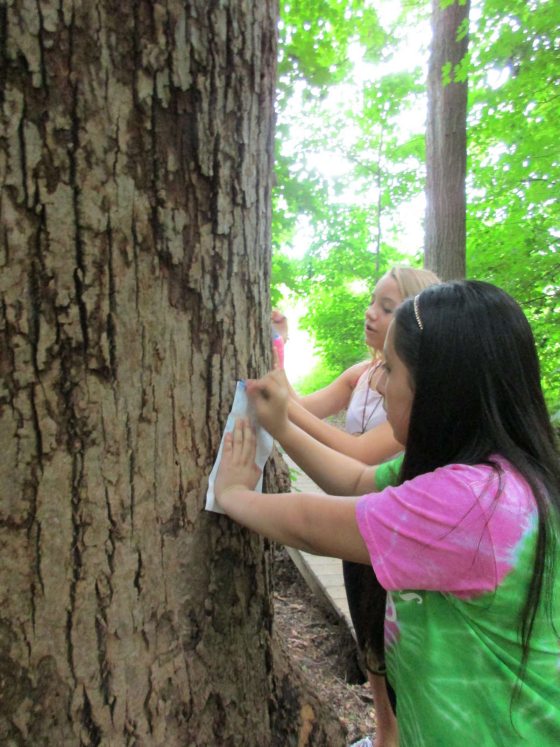It’s that time of year again! We are excitedly getting ready to welcome back young learners into our Gardens with our spring educator-guided school group programs. These programs give PreK-12 students the opportunity to learn about plants, trees, careers in horticulture, or the benefits to spending time in nature through a hands-on, inquiry-based learning experience. As the Longwood Engagement and Learning intern, I have come to know that it is this style of explorative learning that makes our School and Youth programs so special. I’ve been able to see firsthand the impact our educators have on every student that spends time with us in our beautiful classroom space–the Gardens themselves! Upon starting my internship in June 2021, I was immediately impressed by Longwood’s commitment to education, and Longwood’s ever-evolving educational offerings. As I would quickly come to find out, School and Youth learning at Longwood is endlessly exciting—and has recently gotten an update.
Our on-site programs are now done completely outdoors, walking throughout the Gardens, allowing students to be completely immersed in the world of plants. Teachers can bring their classes to our Gardens in the fall and spring for any of our educator-guided program offerings: Plant Power, Tree-mendous Trees, Finding Your Path, the Benefits of Nature, Superpower Senses, and our K-12 Adapted Program. All of our programs are connected to Common Core Curriculum Standards and Next Generation Science Standards, and all introduce career opportunities in horticulture, sparking student interest and helping to prepare the next generation of STEM leaders. During these hour-long programs, students find themselves enjoying hands-on, inquiry-based learning.

While our on-site programs have always been hands-on, they’ve been reworked to have student curiosity guide the way even more, right down to students using tools such as magnifying glasses or color-changing solar beads to explore the natural world. Inquiry-based programming prompts students to ask questions and use tools to discover and find their answers, taking learning into their own hands. It creates investment in what they are learning as they pull their own experiences into what we are focusing on in the Gardens, and leaves a lasting impression and skills after our time with them is over.

This explorative learning is at the forefront of all our program offerings, including our newest program topic: the ways in which nature can be beneficial to a person’s mental health and well-being, which we examine with our educator-guided Benefits of Nature program offered to students grades 6 through 12. During their time with us in the Gardens, these students learn how to apply methods of mindfulness to refocus through breathing exercises, explore how the scents of plants like lavender can help us relax, focus on nature as a tool for inspiration, and use nature journals to guide self-reflection. Our group of educators piloted our Benefits of Nature program this past fall with great success! In fact, Benefits of Nature was one of our most popular programs, perhaps showing a shift in what people find important and valuable in these times.
All students who partake in our Benefits of Nature program use their time with our educators to learn about observation and relaxation in nature and get to do a variety of activities that amplify these concepts. More specifically, our grade 6 to 8 students get to test their observation skills with a “happy stone” activity where each student must identify their own unique stone from a pile. Students keep their stones and are encouraged to use their stone as a reminder of happy thoughts, or a tool for relaxation in stressful moments. Additionally, they work through their nature journals exploring topics from the five senses, to memories in nature, to what happiness means to them. Our students in grades 9 to 12 practice being present and taking time to notice their surroundings by using a wooden frame to focus in on the details in the nature around them. They can then use the details they focused on as inspiration to create a shape poem in their nature journals, or use their journals to focus on defining their stressors and learn about specific ways to relax in nature based on their individual needs.

Our School and Youth team has been busy making sure that our program offerings are nothing short of excellent. In addition to updating our on-site educator-guided programs, we have been working on creating additional experiences tailored for young learners. Keep an eye out for details on art- and photograph-focused summer workshops for ages 12 to 17 to be held in our Gardens this summer. We’ll also soon be sharing information on new seasonal Discovery Box offerings, which include both indoor and outdoor activities with easy-to-follow instructions and materials for hours of fun at home or in any natural environment.
It has been exciting to be involved in the development of such enriching learning experiences for our school and youth guests here at Longwood—and even more so, it has been rewarding to see how much the students enjoy their time with our educators exploring the world of plants and nature throughout our Gardens. We hope to have you come learn with us here at Longwood soon.


